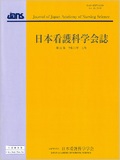Japanese
English
- 販売していません
- Abstract 文献概要
- 参考文献 Reference
- サイト内被引用 Cited by
要旨
目的:近年,アドバンス・ケア・プランニング(ACP)の取組みが注目されているが,慢性疾患患者に対するACPの統一した見解はない.そこで,慢性疾患患者に対するACPの定義を明確にすることを目的に概念分析を行った.
方法:14文献を対象に,Walker & Avantの概念分析方法を用いた.
結果:ACPの属性は【自己決定を行うための理解】【情緒的ゆらぎ】【ACPにたずさわる人々の関係性】【自己決定】【多職種支援へつなげる記録・書面化】【ACPのプロセスの継続と見直し】が抽出された.
結論:慢性疾患患者のACPを「患者の適切な時期に,自己決定を行うための理解を通して情緒的ゆらぎを経験しながら,治療やケアのゴールが導き出され自己決定が行われる過程であり,それは患者・家族とヘルスケア提供者のコミュニケーションにより繰り返し行われる」と定義した.
Aims: Recent initiatives in advance care planning (ACP) are drawing attention in Japan as well. Patients with chronic diseases are not exceptions to this and demand clinical practice of ACP; however, there is no consensus on this topic. Thus, we performed a concept analysis to obtain a clear definition of ACP for patients with chronic diseases.
Methods: The Walker & Avant's method of concept analysis was performed on 14 articles.
Results: The following were extracted as attributes of ACP: understanding required for self-decision-making, relationship between people, emotional vacillation, self-decision-making, ease of access to decisions, and continuity and revision. The antecedents to ACP were appropriate timing to think about ACP while living with illness, being noticed by people involved, and inexperience and preparation of healthcare providers. The consequences of ACP were care that meets the patients' wishes and having an insight for the future.
Conclusions: The ACP for patients with chronic diseases was defined as the timely and cyclical process of drawing out treatment or care goals by adequate communication between healthcare providers and the patients and their families as they experience vacillating emotions.
Copyright © 2021, Japan Academy of Nursing Science. All rights reserved.


